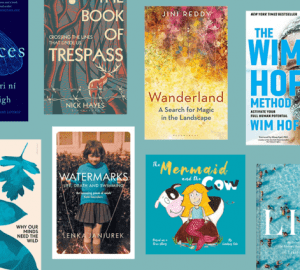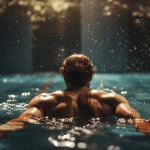Tales from lockdown: how has Covid-19 impacted the world of outdoor swimming?
As coronavirus forces the closure of the world’s open waters, the outdoor swimming community waits patiently for its return.
In March this year, the global spread of Covid-19 caused the world of outdoor swimming to grind to an abrupt and unwelcomed halt virtually over-night. Just as the sport was set to enter into its biggest season to date, with more events taking place around the world and more swimmers taking to the outdoors than ever before, venues were forced to close, events were cancelled or postponed, all coaching stopped, and swimmers were left unable to access the open water in any capacity. It has meant that the new open water season now looks set to amount, regrettably, to nothing.
So, how has the outdoor swimming community adapted to this change? Many swimmers have taken to social media to share their home pools and wheelie bin remedies to get their cold-water fix. But how are swimmers really coping now they are not able to swim? What difficulties do swim businesses now face? And how are athletes and competitive swimmers coping faced with a summer without open water events?
Here we share a handful of lockdown stories from swimmers, coaches, competitive swimmers and business owners about how they are coping without the open water.
Swimming for recreation
It is no secret that there are health benefits associated with outdoor swimming. We have shared many stories in the magazine over the years of swimmers whose lives’ have been transformed since taking to the open water. We are therefore aware that for many of you, for whom swimming has become a lifeline, being unable to swim at this time is difficult.
One such swimmer is Madeleine from north London, who says she had found solace in swimming after struggling with depression. Madeleine swims every week at London Fields Lido and the Hampstead Heath Ladies’ Pond, but since the lockdown has been forced to find other ways of coping. “I’m reading lots of poetry at the moment, particularly about swimming,” she says. “One of my favourites is ‘Aqueous’ by Mab Jones. I’m also dreaming a lot about swimming too. Neither are quite as good as the real thing. But they remind me of the wonderful feeling
of the water!”
She tells us of how she misses life without the water and how it helps her to manage her mental health: “I miss the pool. I miss the sun shining through the trees, the steam rising off the water on crisp mornings,” she says. “I miss cold heads, misty goggles, the smell of chlorine on my skin, my muddy dripping swimsuit. I miss the feeling of locking my bike up and knowing sanctuary awaits on the other side of the wall and I miss holding my breath and drifting along the bottom of the pool. I miss the bubbles. I miss pounding out length after length in the fast lane. I miss a slow breaststroke round the Ladies’ Pond where my sadness lifts and shifts into something more manageable. I know we will all swim again. And I know it will be so lovely when we do. But for now, life is hard without
the water.”
Another swimmer whose mental health has been impacted by the lockdown, is Nicola Keir from East Lothian. Nicola suffers from Cyclical Vomiting Syndrome (CVS), a disorder that causes vomiting, pain and fatigue. She had recently found that swimming was helping with this as it was one of the few exercises that she could manage, even for a few hours, without being sick. She discovered that the cold water alleviated a lot of her symptoms and continued to do so for a few hours. “I get great relief and calmness from swimming,” she says. “I find the cold-water grounding and floating in it almost calibrating. By reducing my emotional intensity, I also reduce the effects of my CVS.
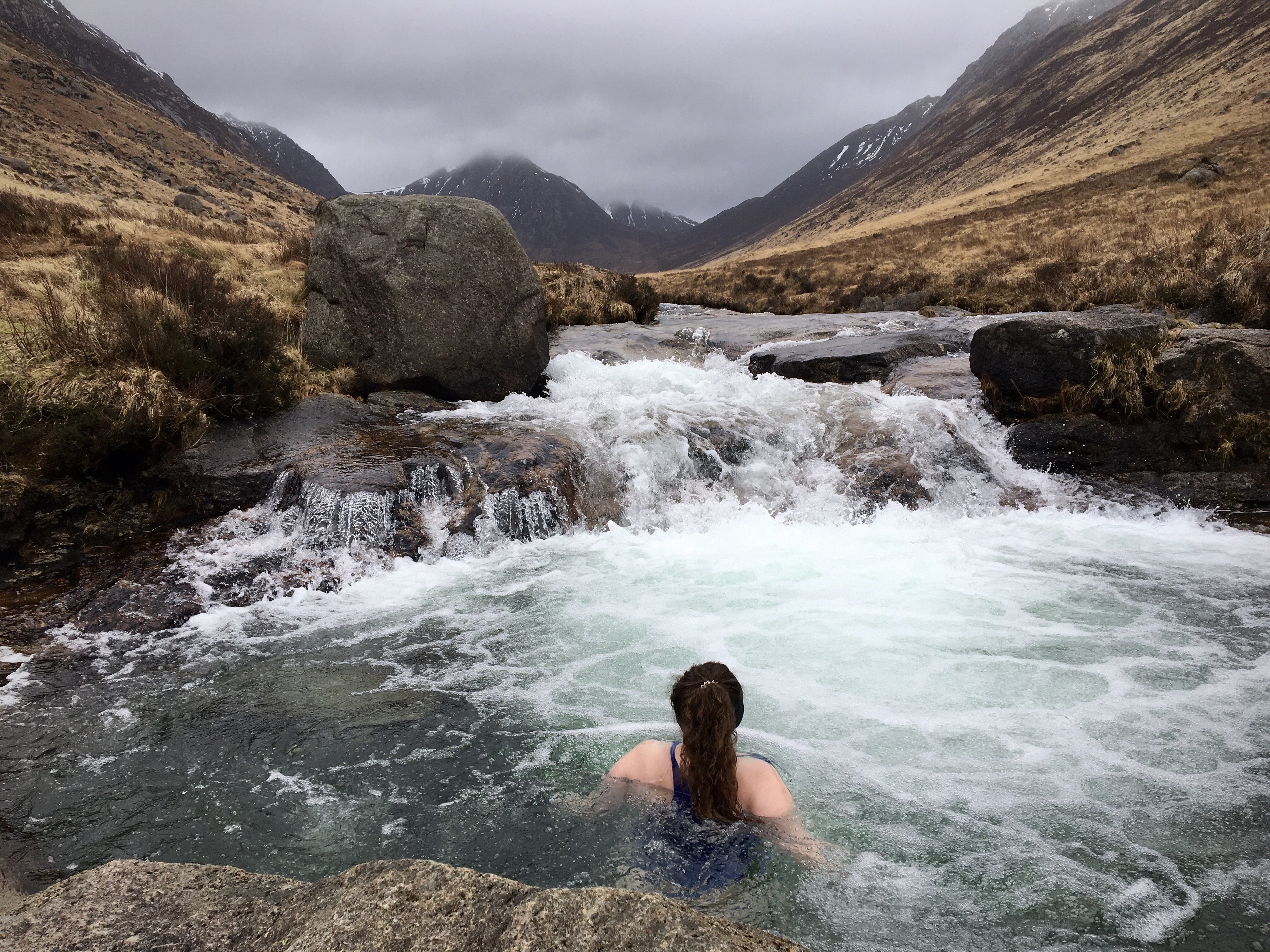
Nicola Keir from East Lothian, Scotland
Without the water, Nicola says that her CVS gets set off quite a lot and she has become very sensitive to the triggers. Before the lockdown, she swam or dipped in the water on the East Lothian coastline and on the Isle of Arran. “I’ve always had a great fondness of the blue world: rivers, burns, lochs, and seas,” she says. “I find these tranquil places bring me closer to nature. Swimming also helps me in a social standpoint as I recently moved to a new area and it was my way to connect with new people.”
Following advice from the coastguard and the RNLI, Nicola has stopped swimming for the time being and has since noticed the negative impact this has had on her mental health. Aside from swimming, the coronavirus has, like it has for a lot of people, reduced the amount of support she has around her from both her family and friends. She says she has had “a few cold showers that didn’t quite do the trick,” to try and replicate the alleviating nature of the water, but has been inspired seeing people’s wheelie bins and back garden pools and hopes to give that a go too.
Swimming for sport
The global coronavirus lockdown could not have come at a worse time for the sport’s competitive and long-distance swimmers. After a long winter of training and anticipation for the new season, many swimmers will have been well in the swing of their intense training plans and looking forward to the long season of open water events. But now with the current uncertainty over coronavirus, many predict no events will be able to take place this season.
Aerin Bowers from western Canada had a busy summer of open water events planned this year. She often participates in up to 12 events a season and this year was set to take on the Lake Zurich Sir Chinmoy 26-kilometre swim.
After finding a coach in January to help her train for Zurich, Aerin had begun working on a training plan that would also begin to prepare her for a Channel attempt next year. Before the lockdown, Aerin was doing three or four workouts a week, each up to 10 kilometres in the pool as well as doing yoga and lifting weights as part of her focussed training plan. She was also in the process of organising her support team, booking flights and sorting out the logistics for some for her big marathon swims. She was enjoying learning what it involved taking her swimming the next level.
But the coronavirus situation has put a stop to Aerin’s plans. “It is disappointing knowing that the milestones I have set are going to have to be pushed back, which requires a lot of patience thinking like that,” she says. “I am a goal orientated person, so swimming gives me the chance to train and focus on something. Now it is a matter of shifting to swimming for enjoyment when we return. Swimming offers me the ultimate balance in life. It helps me process my thoughts and feelings because of the meditative nature of it.”
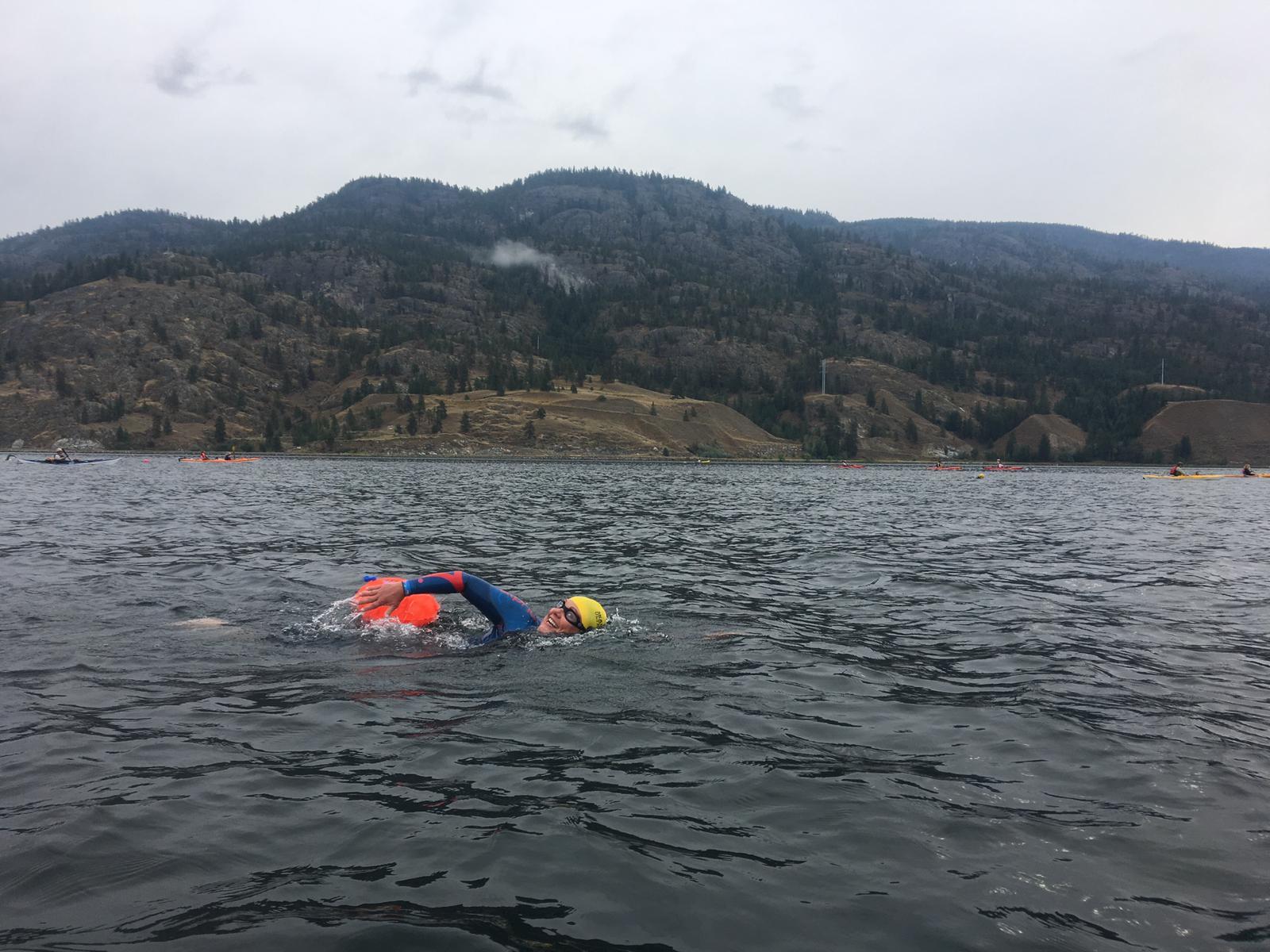
Aerin Bowers from western Canada
It is currently snowing where Aerin lives in eastern Canada, but when the temperature rises in May she plans to pick a local lake and go for a long swim – along with a family member acting as a safe, socially distanced kayaker – as a replacement for Zurich. She contemplates what her identity will be this summer now she is not going to swimming events. “It is a matter of finding creative ways of still setting goals for myself that aren’t necessarily tied to events,” she says.
Many outdoor swimmers who participate in the sport for both competition and recreation are also frontline workers.
For Cath Munro, an A&E doctor from Winchester, swimming was her way of shutting off and escaping from the stresses that come with working in a hospital. “I particularly love long-distance swimming,” she says. “It is a time that no one can interrupt or talk to you. You can get in your own head and switch off. It’s such a peaceful and joyful place to be.”
Cath enjoyed swimming as a child and participated at national and southern county age group events before going on to swim for a year at Loughborough University. After returning to university in Southampton to retrain as a doctor, she decided to start swimming again after a long break, realising that she wasn’t doing enough for her own health. She has since participated in events such as the Dart 10k and won her age group at the England nationals last year. This year she was set to participate at the European championships and had been swimming four to six time a week to prepare before the event was cancelled.
But since the coronavirus pandemic, work and home life for Cath has changed dramatically. One of the main challenges she faces is having to wear different levels of personal protective equipment, which is hot, sweaty and uncomfortable. Due to the risk of spreading the virus, Cath also has to try to keep two metres away from her husband at home and sleep in a separate room, which has been difficult. Returning home from work is also now a chore for Cath. “I have a box for my bag, a box for my keys. I have to leave my shoes outside,” she says. “Then I have to shower my whole body in the same way that you wash your hands. It takes a good half an hour from walking through the front door until I feel that I am really home and can shut off.”
Cath has been trying to get outside as much as she can and enjoys walking in the South Downs, which she can walk to from her home. She is also keeping in touch with her friends through her masters swimming WhatsApp group and has planned a big swim with them all when the lockdown is over.

Cath Munro, an A&E doctor from Winchester, England
The coronavirus has not only had implications on the lives of recreational and competitive swimmers, it has also affected some of the sport’s top athletes.
Sarah Thomas, the record-breaking long-distance swimmer, who in September of last year became the first person in history to complete a four-way Channel crossing, has, like the rest of us, been without the water since the beginning of March when the state of Denver, USA, went into lockdown. “It is a weird time for me,” she says. “I miss being in the water and just floating. Swimming is probably my biggest outlet to make sure that my mental health stays where it needs to be. Swimming is what makes me happy and I don’t necessarily get that from other activities.”
Before the lockdown, Sarah was preparing to take on the End-Wet 36-mile river swim in North Dakota at the end of June, which has now been cancelled. “I’m disappointed that I’m not going to be able to do it,” she says. “But I’m not devastated. I’ve done it a few times before. The thing that is most difficult is that I had a lot of friends who had events coming up this year that were big for them. It has almost been harder for me having their events cancelled as a lot of them had plans to take their long-distance swimming to the next level.”
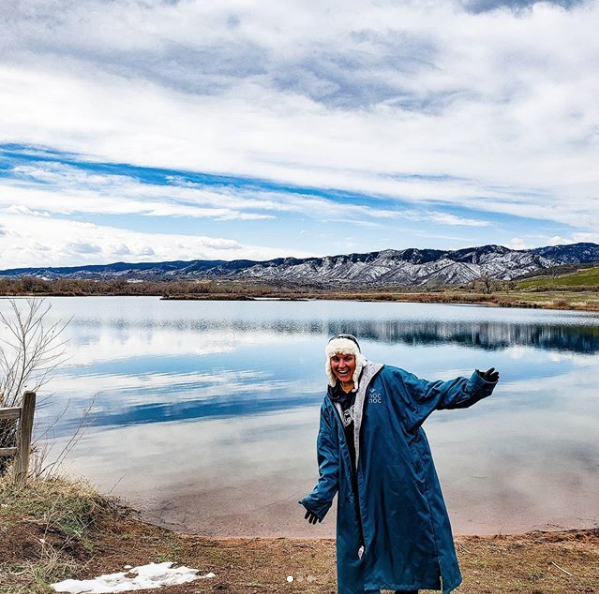
Sarah Thomas, record-breaking long-distance swimmer
Since not being able to swim, Sarah has been running, “running in quotation marks,” she jokes. Where she lives in Denver state, Sarah is able to trail run amongst nice scenery outside. She says that is it not the same as swimming, but it is nice to be outside. She advises any simmers who are missing the open water to stay as active outside as best they can. “It is good to do everything you can to be outside, whether that’s walking or doing exercises in your drive-way or whatever you’re allowed to do. Maximise your time outside and keep in touch with your swim pals,” she says. “I have been trying to mail cards to people. There’s a lot of things to do to keep connected even if you can’t see people. I think connection is the most important thing right now.”
What is Sarah Thomas, the most decorated long-distance swimmer in the history of the sport looking forward to the most about returning to swimming? “I cannot wait to go for a swim with my pals and go for breakfast. I really can’t wait for that,” she says.
Coaches and swim businesses
For swimmers, the break from outdoor swimming will be difficult. But for those who rely on swimming for their livelihood, the coronavirus pandemic has dealt a double blow.
Jason Tait, head coach and owner of South West Swim, a swim coaching business based in Swindon, closed virtually over-night because of coronavirus. “From a business point of view, it was hard decision,” he says. “It was like saying ‘I don’t want to make any money now’. It was a balance between putting people before profit – if not life.”
Concerned for the safety of his swimmers, Jason decided to close South West Swim a week before pools were officially ordered to close by the UK government. He says that despite the resultant loss in income, the business is in a strong position. “I personally think the 2020 season is off,” he says. “It is upsetting and sad, but you have to be realistic with these things. We are now focusing on keeping all of our swimmers engaged and ready for when they can get back to the water.” Jason has been hosting a coffee morning every Monday at 11.30 with his swimmers as well as sharing a dry land session every week. He has also upped his social media activity to generate his customers’ interest for swimming going forward so that when they return to the water, they are raring to go.
The situation was made more difficult for Jason after he was unfortunate enough to catch coronavirus himself. His symptoms were not so serious that he had to be hospitalised, but he says: “it was still possibly the worst I have ever felt illness-wise in my life.” As someone with a fit background in coaching and swimming, Jason found it difficult to breathe even walking up and down the stairs. “It was very painful at times,” he says. “I lost a stone in weight, but I wouldn’t recommend it as a weight loss programme! It was not a nice experience.”
Another coach whose business has been impacted by coronavirus is Jane Greene Pettersson, from west London, who teaches swimming to both children and adults. Jane has come to specialise in teaching people who are afraid of the water, with clients from all backgrounds and ages – some of who have had traumatic past experiences when in water.
Since the lockdown and closure of pools, Jane has had to stop her swimming classes. “It’s a bit strange and hard for me to work out,” she says. “There’s the financial anxiety of everything and then also that I have gone from working all week, being in contact with people all that time, to now not.”
Jane is able to manage financially whilst she has been forced to close, but says it is a shame for her swimmers who were beginning to build momentum in the water. The day before the lockdown, Jane was teaching a 50-year-old man called Franco who had bad memories of swimming lessons at school. He had tried as an adult with the help of a friend to learn how to swim but had got nowhere. Franco had his second lesson with Jane just prior to the lockdown, and knowing that it would be some time before they could continue with lessons, he let go and allowed the water to take him, swimming the whole length of the pool. “I was amazed,” says Jane. “I think he was too. I don’t think either of us expected it. It is always a wonderful moment when someone swims for the first time, but somehow, maybe because of the impending lockdown, this moment felt very profound.”
Because of the nature of her teaching, Jane has been unable to teach online in the same way that other coaches are able to. She has been filling her time by running every morning along the Thames, and often finds herself looking out at the water thinking to herself: “could I?”
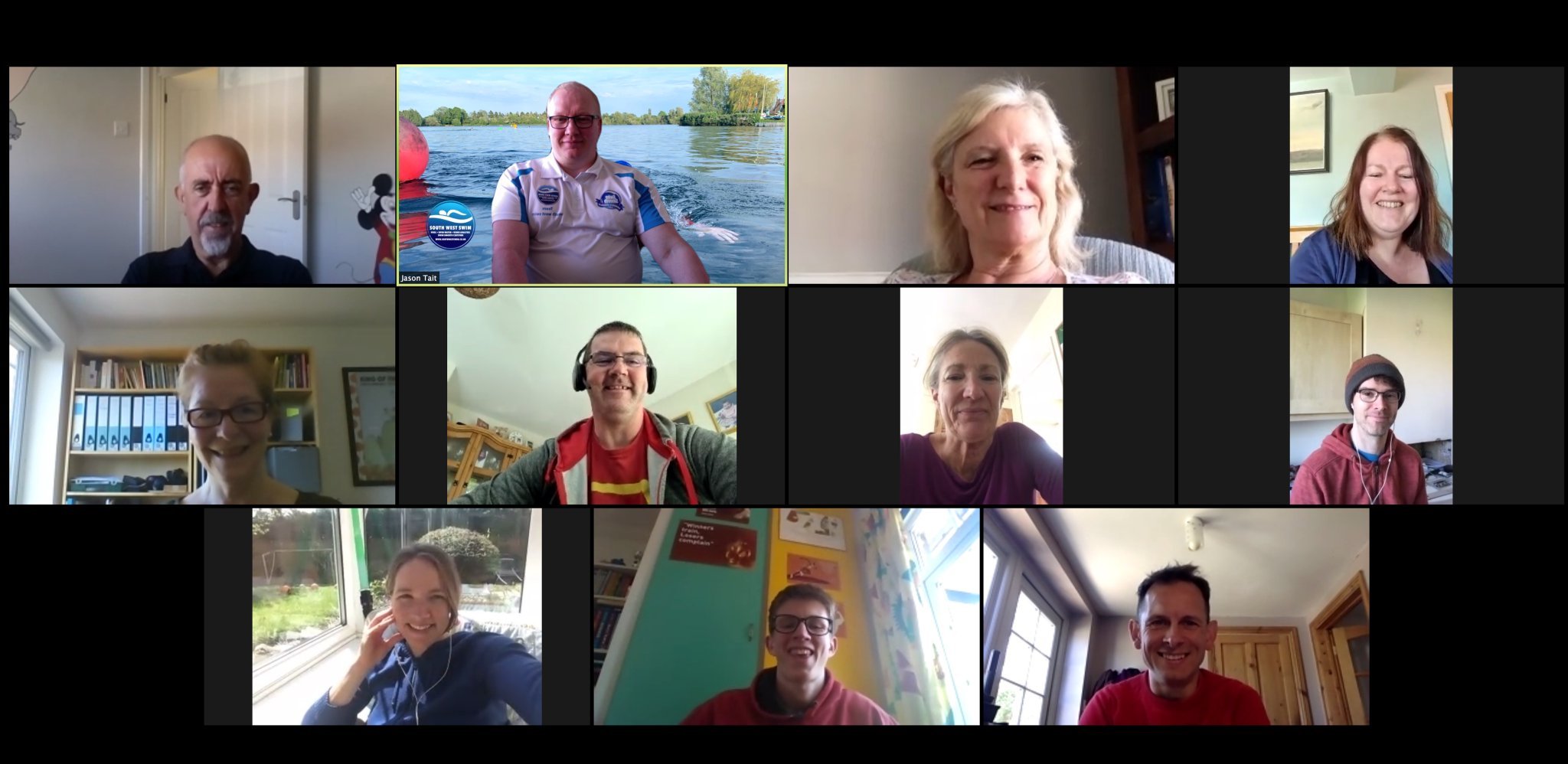
Jason’s Monday morning Zoom coffee break
Like swim coaches and teachers, retailers have also been drastically impacted by coronavirus and the sudden stop in swimming.
Rosie Cook is the founder and owner of Deakin and Blue, a swimwear business that specialises in sustainable swimwear designed to fit a range of female body types. Rosie was set to launch a new range of swimsuits as the coronavirus began to seriously affect the UK but took the decision to postpone the launch until the end of April. “It didn’t feel right to launch when we planned,” says Rosie. “We could tell that things were going to get worse very quickly and so it felt a bit insensitive.”
This was difficult for Deakin and Blue as a small, independent business and because of this have had to cut budgets due to the delaying of their new range. But Rosie still feels that because the products she sells fundamentally solve a problem and has a very loyal customer base, that there is less worry about the business.
Rosie explains that, although it helps, you don’t need to necessarily purchase to support swim brands. “Just by engaging with the brand, sharing our content on social media and engaging with the content you like is helpful,” she says. “We are very conscious that lots of people are money worried at the moment, so we are not expecting to be top of people’s priority lists. But there are lots of ways of supporting a small business that doesn’t involve reaching for your wallet.”
Overall, Rosie believes that the future is still bright for Deakin and Blue and that because they solve a problem for women and have done since they opened, that there will always be a need for their products. Deakin and Blue will also be donating 10% of all profits from the new range to the NHS.
What will the future look like?
For all the difficulties that the community now faces, it is evident from the stories that we have shared and continue to hear, the outlook among outdoor swimmers is overwhelmingly a positive one.
We are sure that everyone reading this will relate in some way to these stories, and there are no doubt thousands of others just like the ones we have told. Swimming may be put on hold for an indefinite period, but the open waters will eventually re-open. And when they do, we will be leaping in with joy.






